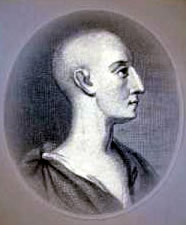Ambrose Philips facts for kids
Ambrose Philips (born 1674 – died 18 June 1749) was an English poet and politician. He often argued with other poets of his time. This led to Henry Carey giving him the funny nickname "Namby-Pamby". This name later meant speech or writing that was too emotional, weak, or silly.
Contents
Ambrose Philips's Life Story
Ambrose Philips was born in Shropshire, England. His family was from Leicestershire. He went to school at Shrewsbury School. Then he studied at St John's College, Cambridge, becoming a fellow there in 1699. He mostly lived in Cambridge until 1708. During this time, he likely wrote his famous Pastorals poems. He also worked for Jacob Tonson, a bookseller. Philips's Pastorals were featured in Tonson's book collection in 1709. This book also included poems by Alexander Pope.
Philips's Political Friends
Philips was a strong supporter of the Whig Party. This was a major political group in England at the time. He was good friends with famous writers like Richard Steele and Joseph Addison. In 1713, a writer in The Guardian newspaper praised Philips's poems. The writer, probably Thomas Tickell, said Philips was the only true follower of the great poet Edmund Spenser. This writer did not mention Pope's poems at all.
The Famous Feud with Alexander Pope
In The Spectator, Addison praised Philips for his simple writing style. He liked that Philips's poems about nature, called eclogues, did not use old Greek or Roman myths. This made Alexander Pope jealous. Pope secretly wrote an article for The Guardian (No. 40). In it, he made fun of his own poems while pretending to praise Philips's worst parts.
Philips was so angry that he reportedly kept a rod at Button's Coffee House. He planned to hit Pope with it! Later, Pope asked John Gay to make fun of Philips's Pastorals in a poem called Shepherd's Week. But people actually liked Gay's poem for its simple style. This was the very quality it was meant to mock.
The writer Samuel Johnson said that Pope and Philips always tried to hurt each other. Pope often made fun of Philips in his writings. Philips appeared in Pope's poems like Bathos and The Dunciad.
The "Namby-Pamby" Nickname
Other writers also made fun of Philips. Henry Carey created the nickname "Namby-Pamby" in his 1725 poem. Here is a small part of it:
All ye poets of the age,
All ye witlings of the stage …
Namby-Pamby is your guide,
Albion's joy, Hibernia's pride.
Pope also used the nickname in his 1728 poem The Dunciad. John Gay and Jonathan Swift also picked up the name. Soon, "Namby-Pamby" became a common term. It described speech or writing that was too emotional, weak, or silly.
Philips's Political Career
In 1718, Philips started a Whig newspaper called The Free-Thinker. He worked on it with Hugh Boulter. Philips became a justice of the peace for Westminster. In 1717, he was made a commissioner for the lottery. When Boulter became the Archbishop of Armagh, Philips went with him as his secretary.
From 1727 to 1749, Philips was a member of the Irish House of Commons. He represented Armagh Borough. In 1726, he became secretary to the lord chancellor. In 1733, he became a judge. His friend and supporter, Boulter, died in 1742. Six years later, Philips moved back to London. He died there on 18 June 1749.
Ambrose Philips's Writings
Philips was known for his pastorals and letters. His description of winter, written from Copenhagen in 1709, was very popular. It was sent to the Earl of Dorset. In a book called English Poets, Philips is remembered for two simple and charming poems. These were written for the young children of John Carteret, 2nd Lord Carteret and Daniel Pulteney.
The Poems That Led to a Nickname
These poems were mocked by Jonathan Swift. They also helped earn Philips the nickname "Namby-Pamby," as mentioned before.
Other Important Works
Philips wrote many other things. He made a shorter version of Bishop John Hacket's Life of John Williams in 1700. He also translated The Thousand and One Days: Persian Tales (1722) from French. This was originally by F. Pétis de la Croix.
Philips also wrote three plays:
- The Distrest Mother (1712), which was based on Racine's play Andromaque.
- The Briton (1722).
- Humphrey, Duke of Gloucester (1723).
Many of his poems were published separately. These included some translations from ancient poets like Sappho, Anacreon, and Pindar. A collection of all his works was published in 1748.
See also
 In Spanish: Ambrose Philips para niños
In Spanish: Ambrose Philips para niños
 | Toni Morrison |
 | Barack Obama |
 | Martin Luther King Jr. |
 | Ralph Bunche |


